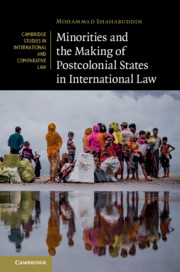Book contents
- Minorities and the Making of Postcolonial States in International Law
- Cambridge Studies in International and Comparative Law: 154
- Minorities and the Making of Postcolonial States in International Law
- Copyright page
- Dedication
- Contents
- Foreword
- Acknowledgements
- Table of Cases
- Abbreviations
- Introduction
- Part I Ethno-nationalism and the Ideology of the Postcolonial State
- Part II International Law and the Postcolonial State
- 3 The Postcolonial ‘National’ State:
- 4 The Postcolonial ‘Liberal’ State
- 5 The Postcolonial ‘Developmental’ State
- Conclusion
- Bibliography
- Index
- Cambridge Studies in International and Comparative Law
Conclusion
from Part II - International Law and the Postcolonial State
Published online by Cambridge University Press: 21 May 2021
- Minorities and the Making of Postcolonial States in International Law
- Cambridge Studies in International and Comparative Law: 154
- Minorities and the Making of Postcolonial States in International Law
- Copyright page
- Dedication
- Contents
- Foreword
- Acknowledgements
- Table of Cases
- Abbreviations
- Introduction
- Part I Ethno-nationalism and the Ideology of the Postcolonial State
- Part II International Law and the Postcolonial State
- 3 The Postcolonial ‘National’ State:
- 4 The Postcolonial ‘Liberal’ State
- 5 The Postcolonial ‘Developmental’ State
- Conclusion
- Bibliography
- Index
- Cambridge Studies in International and Comparative Law
Summary
The conclusion of the book calls for a renewed international law approach to minority rights and the question of statehood – one that takes into account the unique nature and background of postcolonial states and, at the same time, pays attention to minority perspectives going beyond state-centrism, liberal individualism, and neoliberal developmentalism. In this regard, I critically examine a wide range of possible ways out and reform agendas to propose a more humane interrelationship between minorities, postcolonial states, and international law. My reflections, offered as potential approaches to redefining international legal architectures to the advantage of minority groups, cover a wide range of avenues: from revisiting colonial boundaries in principled ways, to accommodating more robust protection for minorities within existing state structures, to radically reconceptualising the state itself through feminist and historiographic revision. I conclude that it is through these alternative approaches to minorities that international law can finally make sense of humanitarian catastrophes in postcolonial states and its involvement therein. Given that the book exposes the way in which international law advances the ideological making of the postcolonial state vis-à-vis minorities, this normative argument can also be replicated in cases beyond the Rohingya and the CHT hill people.
Keywords
- Type
- Chapter
- Information
- Publisher: Cambridge University PressPrint publication year: 2021



